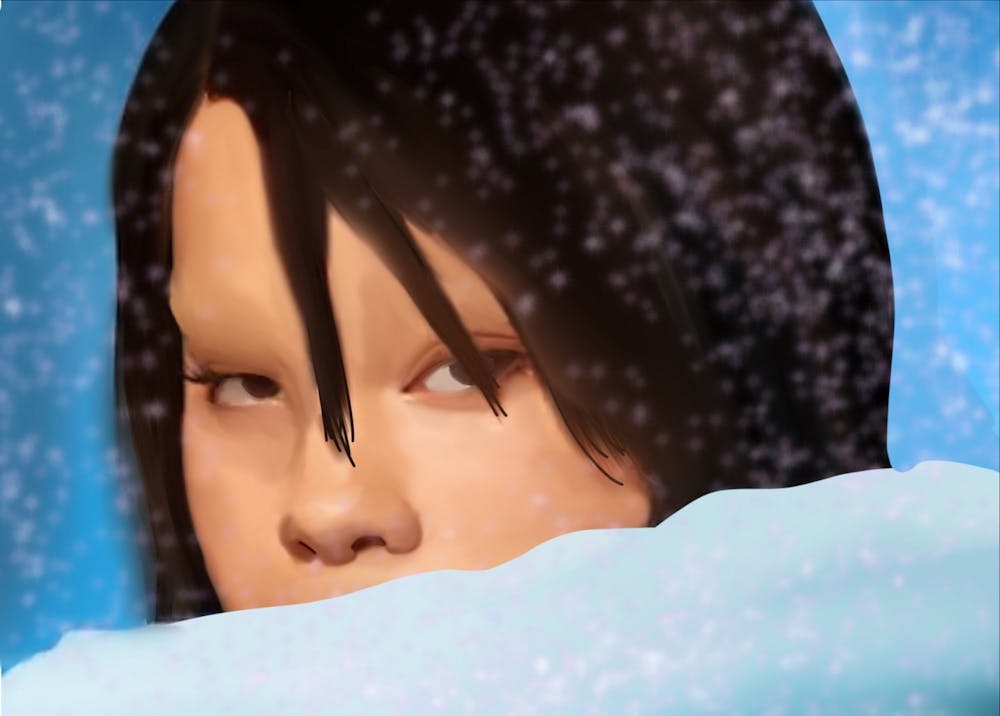Although Shygirl’s career is relatively new, her music has always remained on the cutting edge of what pop music can be. “Nymph,” her first full-length project, is no exception as she alternates between rapping and singing on tracks which display her now-typical electronica style.
Shygirl showed us through her second EP “ALIAS” that she is capable of commanding the club. “Nymph,” though, shows an artist who is more in touch with her emotions. Shygirl seems to have grown from being the party girl to someone much more introspective. In an interview with Rolling Stone, Shygirl explains that the music has a presence while also not being as in-your-face as her previous work.
The album starts off with “Woe,” which begins with a more vulnerable tone before shifting to something much more brazen and sexually-charged. “Woe” serves as the perfect tone-setter for the rest of the album by encapsulating the two attitudes Shygirl takes throughout.
Lyrics such as “you just love to hate, yeah, you do it so well / smiling faces fade just to leave a shell” show Shygirl willing to open up about her feelings. On the other hand, Shygirl also displays a tongue-in-cheek sexual side — “booty so delicious, I just wanna take a bite, though.”
Shygirl follows up “Woe” by leaning into her emotions on “Come For Me,” in which Shygirl sings about finding love even through hardship. At times, Shygirl’s lyrics seem at odds with the experimental production supplied by Arca, a well-known experimental producer and artist. The electronic distortions add a haunting effect to the track which directly contrasts the heartfelt theme of searching for love, making the track seem disjointed.
“Heaven” is a much more successful love song. Poignant lines such as “please ignore all the things I did / if loving you is a sin” glimmer against a more toned down production. Waves crashing at the intro and outro of the song add to Shygirl’s image of “Heaven,” and demonstrate not only Mura Masa’s, but also Shygirl’s skills as a producer as it contributes to the heavenly atmosphere of the song.
In contrast to the sonic disharmony on “Come For Me,” “Nike” is the most unbalanced song lyrically when compared to the rest of the album. “Nike” features Shygirl rapping about how much her partner loves her body. This song, while not objectively bad, feels like it belongs on a different album.
The other songs on the album which contain sexual themes either pair these themes with vulnerable comments or critique sexuality. “Nike” just feels like Shygirl bragging about how sexual she can be with no deeper analysis. Here, Shygirl gives into her bravado too much and produces a song that doesn’t work thematically with the rest of the album.
In spite of a few missteps, the album holds attention throughout thanks to its creative and experimental production choices. “Poison” displays a eurodance flair through the accordion strewn throughout, while “Missin U” embodies unsettling rage with its rickety Sega Bodega co-produced beat.
Even lead single “Firefly” experiments with 90’s and early 2000’s R&B influences through the acoustic guitar chords creatively intertwined throughout to create a song in which Shygirl realizes the person she loves doesn’t love her back — “It’s been so nice not to pretend that we would be together once again / I’m a fool when I know the truth.” Shygirl herself even stated in the same Rolling Stone interview that the song was heavily influenced by Janet Jackson’s work in the late 90’s and early 2000’s.
“Nymph” is an album that shows off Shygirl’s capabilities as one of the next big experimental pop artists. Here, Shygirl uses club music as a means to not only party, but also experience all the emotions love has to offer. Look beyond some of its rougher edges, and “Nymph” is a proper introduction to one of Britain’s biggest new artists.







